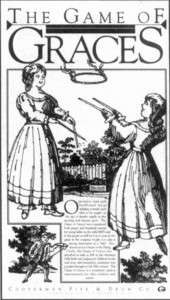Game of graces

The game of graces was a popular activity for young girls during the early 1800s. The game was invented in France during the first quarter of the 19th century and called le jeu des graces.[1] The game of graces was considered a proper game — one befitting young ladies and, supposedly, one that would make them more graceful.
Graces was hardly ever played by boys, and never played by two boys at the same time; the players were always either two girls, or a boy and a girl.[2]
How to play
Graces is played with two people. Each person gets two dowel rods. Then, one of the players takes a wooden hoop and, pushing apart the two rods, sends the hoop into the air for the other player to try to catch. The winner is the player who is first to catch the hoop ten times.
Mastering aiming and catching the hoop can be very time consuming. To throw the hoop, one takes the hoop and, with one rod in each hand, places the hoop over both of the rods so that they are inside of the hoop. The player then lets the hoop slide slightly down the rod and crosses the rods in an X shape. Ideally, the hoop is on the lower triangle of the X shape. Then, pulling the rods apart, the hoop quickly slides up and shoots away from the player, towards the direction in which the player aims.
The hoop is generally 9 inches (23 cm) in diameter and decorated with different colored ribbons. The ribbons, used to make the hoop softer to catch, are alternatingly wrapped all around the hoop, with the ends left hanging off so that they will slow down the hoop's flight.[3] The rods are 15 inches (38 cm) to 2 feet (61 cm) long. Some rods come to a point.[4]
Modern times
The poster shown here is from Cooperman Company, a Vermont shop that reproduces this game for museums throughout the country using solid steam bent hoops made as the originals were. In 2011 System Enterprises, a toy company based in Florida, introduced a game called RingStix, which can now be found in several specialty toy stores across the United States. The concept is the same, but the rods have been replaced by curved sticks and the wooden ring by a plastic glow-in-the-dark ring.[5][6]
References
| Wikisource has the text of the 1911 Encyclopædia Britannica article La Grâce. |
- ↑

- ↑ Children Info-Games
- ↑ Research Center - Game of Graces
- ↑ graces
- ↑ "RingStix". RingStix. Retrieved 2014-01-27.
- ↑ "Outdoor Game – Ring Stix". Nature For Kids. 2011-10-12. Retrieved 2014-01-27.